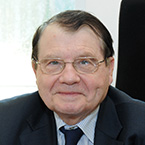
Renowned for one of the most notable discoveries of the 20th century, the human immunodeficiency virus (HIV), Dr. Montagnier received the 2008 Nobel Prize in Medicine or Physiology over 20 years after his discovery. In 1983 he headed a team at the Pasteur Institute in Paris that determined retroviral enzymatic activity was responsible for the pathogenic effect on white blood cells occurring in a mysterious new syndrome, AIDS. Montagnier and his team named the responsible pathogen lymphadenopathy-associated virus (LAV), later called HIV. In 1985, he also isolated the second AIDS virus, HIV2, from West African patients. For many years, credit for the discovery of the AIDS virus was a subject of controversy, and it took the French and U.S. Presidents to forge an accord.
Dr. Montagnier’s current studies are aimed at the diagnosis and treatment of microbial, viral, and epigenetic factors associated with cancer as well as neurodegenerative and articular diseases. A strong advocate of preventive medicine, he is especially concerned with prolonging the active life of aging people. He has received over a dozen honorary degrees and been elected to national academies worldwide.
Career Highlights
2009 Grand Officer, Legion of Honor, France
2008 Nobel Prize in Physiology or Medicine
2000 Prince of Asturias Award
1998 Warren Alpert Prize
1994 Neil Hamilton Fairley Prize, Royal College of Physicians of London
1994 Commander, Legion of Honor, France
1993 King Faisal Foundation International Prize
1989 Elected Member, National Academy of Medicine, France
1988 Japan Prize
1987 Gairdner Foundation International Award
1986 Prix Louis-Jeantet de Médecine, Fondation Louis-Jeantet, Genéva
1986 Albert Lasker Clinical Medical Research Award
1986 Korber Foundation Prize
1985 Prix Gallien, Gallien Foundation
1960 PhD, University of Paris